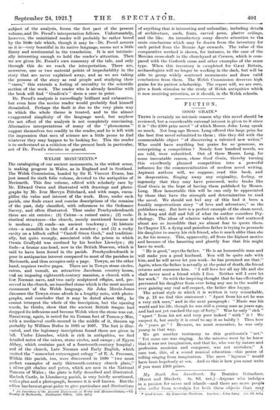FICTION.
GOOD GRAIN.• THERE is certainly no intrinsic reason why this novel should be reviewed, but a considerable external interest is given to it since it is " the £500 prize novel " of which Messrs. John Long speak so much. Not long ago Messrs. Long offered this large prize for the best first novel submitted to them ; this they did with the commendable object " of discovering a talented new writer." Who could have anything but praise for so •generous, so enterprising a competition ? Nearly four hundred novels, we are told, were submitted. Out of these Messrs. Long, for some inscrutable reason, chose Good Grain, thereby turning this excellently planned competition into a powerful influence for the commercialization of modern novel writing. Aspirant authors will, we suppose, read this book, and in desperation, flinging away any originality, feeling, or ingenuity that they may have possessed, write books like Good Grain in the hope of having them published by Messrs. Long. How lamentable this will be can only be appreciated by those that have the strength and determination to read the novel. We should not feel any of this had it been a frankly unpretentious story " of love and adventure," as the publishers say. But here is a perfect example of the sham novel. It is long and dull and full of what its author considers Psy- chology. The ideas of relative values which we find scattered about are so incredible that we almost fear to quote them. In Chapter IX. a dying and penniless father is trying to persuade his daughter to marry his rich friend, who is much older than she is, for his money. This, apparently, all from the highest motive and because of the haunting and ghastly fear that Iris might have to work.
" He is good," says the father. " He is an honourable man and will make you a good husband. You will be quite safe with him, and he will never let you work—he has promised me that." Again, when the father is actually at the point of death, the friend returns and reassures him. " I will love her all my life and she shall never need a friend while I live. Neither will I ever let her work." So with the inspiring thought that he has effectually prevented his daughter from ever being any use in the world or ever gaining any real self-respect, the father dies happy.
The actual style in which it is written is very remarkable. On p. 13 we find this statement : " Apart from his art he was a very rich man," and in the next paragraph : " Music was his world and his life, though he was still a young man as years ago, and had not yet reached the age of forty." Was he only " rich " " apart " from his art and very poor indeed " with " it ? We suspect it, but surely it is cruel to say it so baldly ? Then how do " years go " ? Because, we must remember, he was only young in that way. We get another testimony to this gentleman's " art." " Yet some one was singing. As the minutes went by ho knew that it was not imagination, and that he, who was by nature and profession musician and composer, was not mistaken." A sure test, this, of a sound musical education—this power of telling singing from imagination. The mere " layman " would have been hopelessly at sea. And so this is how you must write if you want £500 prizes.


































 Previous page
Previous page